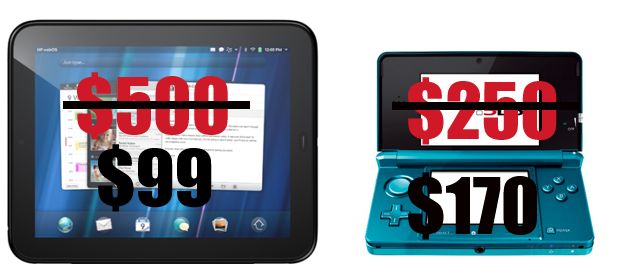HP TouchPad, Nintendo 3DS show the power of the price cut

If you are like most people in America today, then you are probably broke. But like most other people, you also harbor an unrelenting lust for the latest technology. How do you reconcile these two clearly conflicting states? By waiting for a price cut, apparently.
Two recent examples show that sometimes all it takes to revive a lagging gadget is to cut its price. Last month, of course, there was the TouchPad, which went from $500 non-desirable to the most sought-after gadget of the summer. The impetus? HP announced that it was killing the device, and, in a attempt to rid itself of the things, said that it was cutting the TouchPad's price to $99. Suddenly, the tablet that no one wanted became the very thing that everyone desired. The perfect impulse buy, the $99 TouchPad was such a bargain that people lined up overnight in order to purchase it. The earth had turned on its own head.
And then there is the Nintendo 3DS. Dogged by poor sales and lukewarm consumer interest, the 3DS has had a pretty sad run in the months following its release. In August, realizing the console's dire situation, Nintendo cut the price of the 3DS from $250 to $170 in the hopes that the price drop would spark a surge in sales.
And that's exactly what happened. The company announced on Thursday that it had sold 185,000 3DS units in the nineteen days following the price cut, a 260 percent increase over a similar period in July. Japanese retailers also posted similar sales increases, with sales of the 3DS nearing 200,000 during the first week after the price drop. Is the 3DS's outlook starting to brighten? It sure seems that way.
Both examples show that the largest factors in the renewed interest in both devices weren't the devices themselves, but their suggested retail prices. If money talks, then the price drop is the loudest bellow of all. Other companies should take note.
